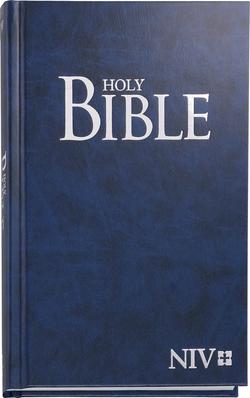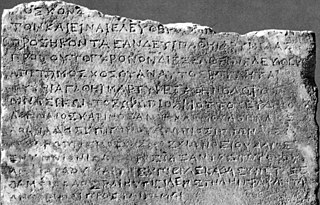Related Research Articles

The King James Version (KJV), also the King James Bible (KJB) and the Authorized Version (AV) is an Early Modern English translation of the Christian Bible for the Church of England, which was commissioned in 1604 and published in 1611, by sponsorship of King James VI and I. The 80 books of the King James Version include 39 books of the Old Testament, 14 books of Apocrypha, and the 27 books of the New Testament.

The New International Version (NIV) is a translation of the Bible into contemporary English. Published by Biblica, the complete NIV was released in 1978 with a minor revision in 1984 and a major revision in 2011. The NIV relies on recently-published critical editions of the original Hebrew, Aramaic, and Greek texts.
William Tyndale was an English biblical scholar and linguist who became a leading figure in the Protestant Reformation in the years leading up to his execution. He is well known as a translator of the Bible into English, and was influenced by the works of prominent Protestant Reformers such as Martin Luther.

The New World Translation of the Holy Scriptures (NWT) is a translation of the Bible published by the Watch Tower Bible and Tract Society; it is used and distributed by Jehovah's Witnesses. The New Testament portion was released first, in 1950, as The New World Translation of the Christian Greek Scriptures, with the complete New World Translation of the Bible released in 1961.

The Bible has been translated into many languages from the biblical languages of Hebrew, Aramaic, and Greek. As of September 2023 all of the Bible has been translated into 736 languages, the New Testament has been translated into an additional 1,658 languages, and smaller portions of the Bible have been translated into 1,264 other languages according to Wycliffe Global Alliance. Thus, at least some portions of the Bible have been translated into 3,658 languages.
Partial Bible translations into languages of the English people can be traced back to the late 7th century, including translations into Old and Middle English. More than 100 complete translations into English have been produced. A number of translations have been prepared of parts of the Bible, some deliberately and some projects have been abandoned.

The English Standard Version (ESV) is a translation of the Bible in contemporary English. Published in 2001 by Crossway, the ESV was "created by a team of more than 100 leading evangelical scholars and pastors." The ESV relies on recently published critical editions of the original Hebrew, Aramaic, and Greek texts.
George Mamishisho Lamsa was an Assyrian author. He was born in Mar Bishu in what is now the extreme east of Turkey. A native Aramaic speaker, he translated the Aramaic Peshitta Old and New Testaments into English. He popularized the claim of the Assyrian Church of the East that the New Testament was written in Aramaic and then translated into Greek, contrary to academic consensus.

Wycliffe's Bible or Wycliffite Bibles (WYC) are names given for a sequence of Middle English Bible translations believed to have been made under the direction or instigation of English theologian John Wycliffe of the University of Oxford. They represent the earliest known literal translations of the entire Bible into English. They appeared over a period from approximately 1382 to 1395.

John 3:16 is the sixteenth verse in the third chapter of the Gospel of John, one of the four gospels in the New Testament. It is deemed one of the most popular verses from the Bible and is a summary of one of Christianity's central doctrines; the relationship between the Father (God) and the Son of God (Jesus). Particularly famous among evangelical Protestants, the verse has been frequently referenced by the Christian media and figures.

Epiousion (ἐπιούσιον) is a Koine Greek adjective used in the Lord's Prayer verse "Τὸν ἄρτον ἡμῶν τὸν ἐπιούσιον δὸς ἡμῖν σήμερον". Because the word is used nowhere else, its meaning is unclear. It is traditionally translated as "daily", but most modern scholars reject that interpretation. The word is also referred to by epiousios, its presumed lemma form.

Chapter and verse divisions did not appear in the original texts of Jewish or Christian bibles; such divisions form part of the paratext of the Bible. Since the early 13th century, most copies and editions of the Bible have presented all but the shortest of the scriptural books with divisions into chapters, generally a page or so in length. Since the mid-16th century, editors have further subdivided each chapter into verses – each consisting of a few short lines or of one or more sentences. In the King James Version (KJV) Esther 8:9 is the longest verse and John 11:35 is the shortest. Sometimes a sentence spans more than one verse, as in the case of Ephesians 2:8–9, and sometimes there is more than one sentence in a single verse, as in the case of Genesis 1:2.
Green's Literal Translation or the Literal Translation of the Holy Bible (LITV) is a translation of the Bible by Jay P. Green, Sr., first published in 1985. The LITV takes a literal, formal equivalence approach to translation. The Masoretic Text is used as the Hebrew basis for the Old Testament, and the Textus Receptus is used as the Greek basis for the New Testament. This translation is available in book form and is freely available online for use with the e-Sword software program. Some also refer to it as the "KJ3" or "KJV3".

The term Catholic Bible can be understood in two ways. More generally, it can refer to a Christian Bible that includes the whole 73-book canon recognized by the Catholic Church, including some of the deuterocanonical books of the Old Testament which are in the Greek Septuagint collection, but which are not present in the Hebrew Masoretic Text collection. More specifically, the term can refer to a version or translation of the Bible which is published with the Catholic Church's approval, in accordance with Catholic canon law.

Sacred Name Bibles are Bible translations that consistently use Hebraic forms of the God of Israel's personal name, instead of its English language translation, in both the Old and New Testaments. Some Bible versions, such as the Jerusalem Bible, employ the name Yahweh, a transliteration of the Hebrew tetragrammaton (YHWH), in the English text of the Old Testament, where traditional English versions have LORD.

Good News Bible (GNB), also called the Good News Translation (GNT) in the United States, is an English translation of the Bible by the American Bible Society. It was first published as the New Testament under the name Good News for Modern Man in 1966. It was anglicised into British English by the British and Foreign Bible Society with the use of metric measurements for the Commonwealth market. It was formerly known as Today's English Version (TEV), but in 2001 was renamed the Good News Translation in the U.S., because the American Bible Society wished to improve the GNB's image as a translation where it had a public perception as a paraphrase. Despite the official terminology, it is still often referred to as the Good News Bible in the United States. It is a multi-denominational translation, with editions used by many Christian denominations. It is published by HarperCollins, a subsidiary of News Corp.
Bible translations into Hebrew primarily refers to translations of the New Testament of the Christian Bible into the Hebrew language, from the original Koine Greek or an intermediate translation. There is less need to translate the Jewish Tanakh from the Original Biblical Hebrew, because it is closely intelligible to Modern Hebrew speakers. There are more translations of the small number of Tanakhas passages preserved in the more distantly related biblical Aramaic language. There are also Hebrew translations of Biblical apocrypha.

Ioudaios is an Ancient Greek ethnonym used in classical and biblical literature which commonly translates to "Jew" or "Judean".
Jeannine K. Brown is an American New Testament scholar who focuses on the Gospels, Hermeneutics and New Testament literary analysis. She is a professor at Bethel University in Saint Paul, Minnesota.
References
- ↑ The Quest, Volume 5. Theosophical Society in America. 1992. p. 291. Retrieved 21 December 2015.
- 1 2 3 Paul, William E. (2003-01-08). English Language Bible Translators. McFarland. pp. 87–88. ISBN 9780786442430.
- ↑ Wildman, David (December 6, 1998). "New troupe stages Weill on the run". The Boston Globe. Archived from the original on February 20, 2016. Retrieved 2015-12-24.
- 1 2 Bratcher, Robert (1993). "Review: Unvarnished New Testament". The Bible Translator . 44 (1): 147–149. doi:10.1177/026009359304400107 . Retrieved 20 December 2015.
- ↑ Goodwin, Philip (2013-02-28). Translating the English Bible: From Relevance to Deconstruction. James Clarke & Co. p. 37. ISBN 9780227173916.
- ↑ Esteves, Lenita Maria Rimoli. "Revelation or understanding: some ideas about the translation of religious texts". Trabalhos em Linguística Aplicada. 50 (2): 235–256. doi: 10.1590/S0103-18132011000200002 . ISSN 0103-1813.
- ↑ Wagner, Michael; McCurdy, Katherine (2010-11-01). "Poetic rhyme reflects cross-linguistic differences in information structure". Cognition. 117 (2): 166–175. doi:10.1016/j.cognition.2010.08.007. PMID 20889149.
- ↑ Rosenberg, Scott (January 18, 1983). "Just Desserts". The Boston Phoenix. Retrieved 2015-12-24.
- ↑ Foster, Catherine. "Washington Squares: folk at the Rat; Picasso at Fogg; songs of city life; City life in song". Christian Science Monitor. ISSN 0882-7729 . Retrieved 2015-12-24.
- ↑ Goodman, Walter (1986-02-17). "STAGE: 'EMMA,' HOWARD ZINN'S TALE OF RADICALS". The New York Times. ISSN 0362-4331 . Retrieved 2015-12-24.